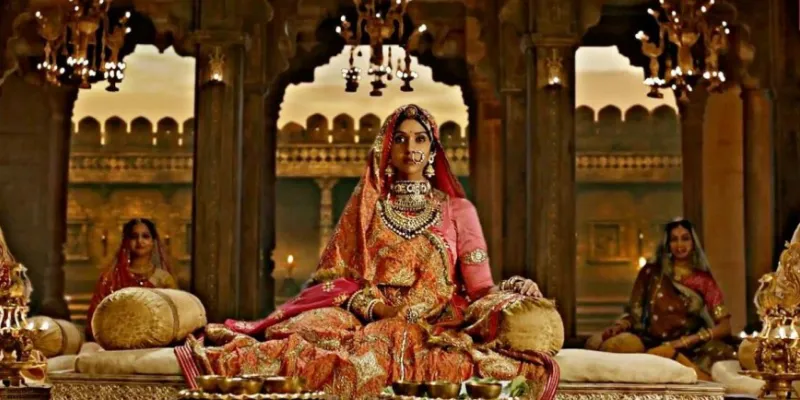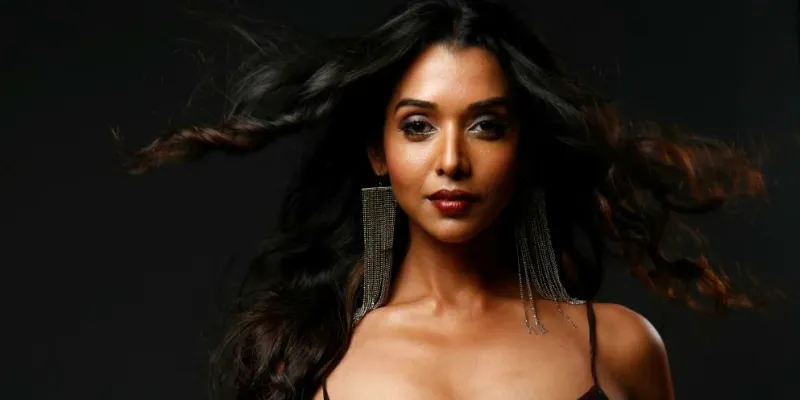From the graveyard shift at a BPO to Rani Nagmati in Padmaavat, here's Anupriya Goenka’s inspiring journey
She first stunned you as the utterly mysterious yet endearing daughter and girlfriend from India's first ever lesbian ad by Myntra - and you then witnessed her leapfrog into the silver screen as she took on even more prominent roles in big banners like Tiger Zinda hai and now, Sanjay Leela Bhansali's magnum opus Padmaavat.
Even in the face of hardship, Anupriya Goenka clung onto one fond childhood memory in order to stay sane, and even happy – emoting freely and expressing unabashedly, during a month-long theatre workshop she took in school.
She maintains that it was one of the best times of her life; that it changed the way she perceived the world. Train rides became instantly more romantic, traffic lights tantalising, people’s faces more inviting. The debt from her family’s failed businesses, however, stayed daunting – and as a result, the artist in her quashed.
But still, she rose.
The story that started with her being the sole bread-winner during a tumultuous financial spell in her family, and ended in the cast of Sanjay Leela Bhansali’s magnum opus, is as pluralistic as the roles she has essayed to get there. Meet Anupriya “Nagmati” Goenka.

Starting in a starkly different reality
Born to a typical Marwari business family from Kanpur that was steeped in traditions but not averse to modernity, Anupriya Goenka was only six when the family moved to Delhi for a fresh start after a failed business endeavour.
And ever since she could say the word business, she knew that her family needed all hands on deck for their next. So, she toed the line right after school, and joined their manufacturing unit and export house of garments.
“That’s one thing I miss - not having a quintessential college experience. But well, I learned a lot from life instead,” she says.
This business, however, struggled to stay afloat – and after trying hard to salvage it for a year-and-a-half, she shut shop.
“A period of handling bank liabilities, court cases and financial crises ensued, which taught me a lot as a person,” she recounts.
Almost immediately, an initiation into the corporate grind followed – falling in line with the BPO wave. From being a customer service representative working the graveyard shift, to advance up the rungs and become a voice and accent trainer, and eventually, a process trainer, she chased the corporate dream with all her might and gumption only to eventually realise it was a mirage.
She had even moved her entire family to Jaipur by then – but in her pursuit of true happiness, she signed up for a theatre workshop with Neeraj Kabi. “When I was training with him, everything looked beautiful, I was happy,” she recalls.
However, being the only earning member of the family, and having three home loans to pay off, maintaining a regular, steady income became important.
Chasing the dragon, however, she also started pursuing professional theatre on the side. While it was getting increasingly difficult to manage with a full-time job that almost inadvertently spilled out of the 9 to 5 rubric – and the more involved she was in acting, the stronger she desired to excel in it.
Thus, the family agreed that Anupriya would give it her all for three months and resume her career in the corporate space if the efforts didn’t turn up any substantial results.
The trial
If this were a Bollywood film, an audition for a role in a big-banner multi-starrer would fall into her lap on the eve of her deadline – but in reality, when and how three months come and go, especially during the infamous struggle period an actor is undergoing, is anybody’s guess.
She bagged seemingly important roles and rehearsed for months for multiple plays that would never see the light of the day.
“Theatre is a very expensive hobby in Mumbai. I would travel for four hours from Thane to Juhu and back for a rehearsal each day. I had started being delinquent in paying the loans, So, I was forced to take up a job again. Those one-and-a-half years were extremely confusing as I kept oscillating between acting and corporate jobs,” she says.
However, knowing that she was definitely onto something, she not only kept auditioning but also learning, and participated in several workshops with the likes of Quaserthakore Padamsee, Alok Ulfat, and Divya Palat.
“The best was Aadi Shakti, a theatre laboratory where I had one-on-one sessions for a month. It connected me deeply with the actor, the method and the woman in me. I did a lot of plays with esteemed theatre directors like Satyadev Dube Sir, Makrand Deshpande, Lilette Dubey, and Akash Khurana,” she narrates.
Leading these dual lives was eating into her time and bandwidth and eating away at her sanity – and the time came to make a choice. “Between a settled life and a life of uncertainties, you can see what I chose. I was earning very well, all was improving and things were settling down, however, I felt incomplete and I felt something was missing. So, once I bought a house for my family, and shifted them to Bombay, I turned to acting full-time,” she says.
Take two!
Suddenly, she found herself mostly busy, but without any real work, a common phenomenon in the lives of fledgling actors.
“Here, you have to build relationships which I am not very good at, I’m a reserved person and sometimes that can be misunderstood as arrogance, though I try and want to change that about myself!” she quips.
For women, she says, the challenge is two-fold. “As a girl, unfortunately, one has to be cautious about the way you talk, what you imply, and how you are dressed. You have to be friendly but not too friendly. You have to be firm yet polite. Women are judged by these parameters not just in the entertainment world, but in households, offices, and among friends. There are people who make you feel that being with them in a certain way would help you get more roles,” she reveals.
While nepotism does exist in Bollywood, almost as crucial during this phase is hard work and honesty, which is something she brought on in abundance.

“Just imagine, as part of our job, we have to scout and apply for opportunities every day, meet different people with different energies and go through auditions and rejections daily, while trying to support ourselves. But now that scripts have become so important, content has become the king, and so many platforms are opening up, it is easier to get roles that you deserve,” she states.
Her first big project came in the form of the Bharat Nirman ad campaign by the Congress, directed by Pradeep Sarkar, and was well received and showcased pan India. During the same time, she starred in a few Telugu movies like Pathshaala and Potugadu.
However, what doubled up as her proverbial “big break” was the Myntra Anouk Ad – credited to be India’s ‘first lesbian ad’, which went viral, and garnered Anupriya in particular, a lot of appreciation for a hauntingly memorable performance.
Much like the fictitious parents from the ad who were at the door ready to embrace her bold choices, the industry fell in line as well - as roles in mainstream, big-budget films like Tiger Zinda Hai and Padmaavat, came calling. “When you get the opportunity to work with YRF and Sanjay Leela Bhansali, the experience itself is profound,” she says.
And she was not one to take these opportunities lightly either – for Tiger Zinda Hai, she took a workshop with her “guru,” Prashant Singh. “I thoroughly prepare for each role. I visited hospitals to study the body language of nurses, read up a lot on terrorism and watched several disturbing videos surrounding the topic. It was extremely traumatic but it was important to incorporate nuance into my role.”
Another Nagesh Kukunoor film where she holds the titular character, Maya, which is still due for release – is something she holds very close to her heart. “Maya was an especially intense character with a wide graph, almost bordering on darkness. I stopped all social interactions from the time I was finalised and till our shoot concluded,” she reveals.
On the women in Padmaavat, and women in general
There have been many more opportunities, Anupriya says, which offered great money and better exposure, but she would turn them down on principle for she felt that they were not portraying women in the right way.
But somewhere, nestled in the grey wiggle room, lay her latest film Padmaavat, which has been the darling of controversy right from when they began shooting.
The right-wing instigated attacks by the Karni Sena aside, most recently, the film came under fire when fellow-actor Swara Bhaskar accused it of being sexist and glorifying Jauhar.
So, we ask her if she felt that the thin line between depiction and glorification was honoured by the filmmakers, or if it was crossed. “It was an accurate depiction and not glorification. Practices like Jauhar existed not because the men wanted their women dead after them, but because the invaders would subject them to a lifetime of brutality, with no hope of escaping, like there might be in today’s day and age. To say that it can have a negative bearing on 21st-century minds, I beg to differ, that way one can't show murder or any heinous act on screen for the fear of negatively influencing some person. How will one tell stories then? I am very proud of the film and deeply respect Sanjay Sir's vision. He has the right to present it according to his sensibilities and understanding, but the audience also has the right to judge it as per their own individual sensibilities. So, I also respect Swara Bhaskar's or anyone else's right to opine,” she says.
Criticism also surfaced that her own character – not her acting, mind you - of Rani Nagmati was rather flat and lacked the necessary depth, and did not get the respect of a good enough backstory; but Anupriya insists that Padmaavat’s focus needed to remain on Rani Padmavati, Rawal Ratan Singh, and Allauddin Khilji.
“My character Nagmati’s motive, dichotomy, the constant fight within her showed. Audiences, as well as members of the industry, showered a lot of affection and praise for me on social media for my performance. But yes, the only way to level the playing field is by encouraging more women to be a part of the internal aspects of the movies, giving them their due and by writing strong women characters, which have always been around us in real life; they just need to be brought out more on celluloid,” she says, signing off.







